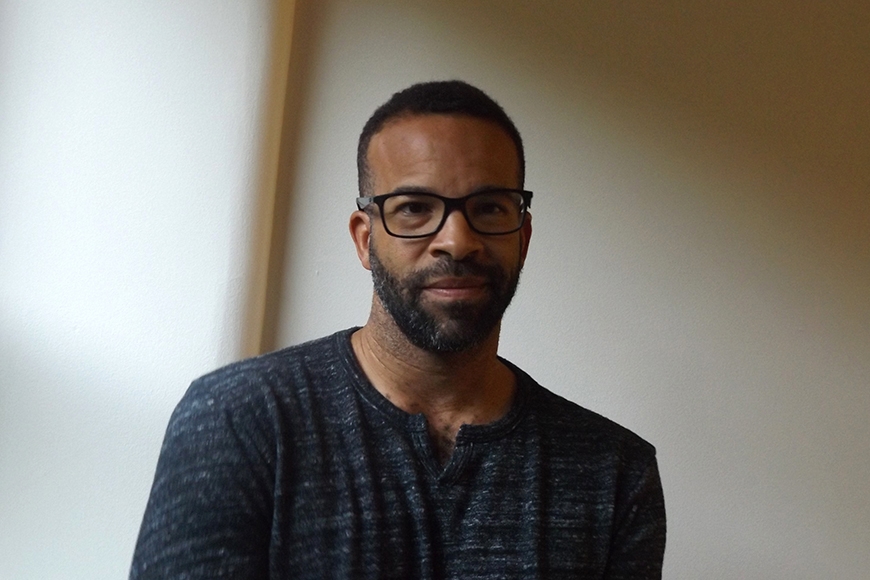Meet Assistant Professor Douglas Kearney
A poet and essayist, Douglas Kearney joined the Creative Writing Program faculty this fall. He is the author of four poetry collections, including his latest, Buck Studies (Fence Books, 2016), which won the Theodore Roethke Award, the CLMP Firecracker Award, and a California Book Award Silver Medal. He published the nonfiction volume Mess and Mess and with Noemi Press in 2015. He has also written and performed several libretti for opera and the stage. Professor Kearney received his MFA from CalArts; he then taught there for 12 years as core faculty. He generously responded to our questions, below.
What are you currently writing?
"I’ve been working on
poems that are explicit
in their considerations of
acting as a means of
viewing the hypervisibility
many have associated
with Black subjectivities."
I have a few projects going right now. The first is a collection of personal and critical writings that sort of pick up with what I was learning to do in Mess and Mess and (Noemi, 2015). Beyond the techniques, there are questions about performance that I’ve had to think through since publishing that book, as well as typographically performative recordings of me watching Beyoncé and Kendrick Lamar videos.
I’ve been working on poems that are explicit in their considerations of acting as a means of viewing the hypervisibility many have associated with Black subjectivities. These poems were part of a chaplet published in the Twin Cities and Yellow, Ohio a couple of years ago by Wintered Press (Gabrielle Civil and alumna Rachel Moritz) called “The Techniques of Acting.” The manuscript in progress, which I’ve called Actors, Not Real People, includes a series of poems about the late great Prince and his hair as seen in about 15 years of music videos.
The third project is an opera in development with The Industry in LA.
Oh and at any moment, a project could be overturned by new developments. I’ve been composing writing in PhotoShop inspired by some of Susan Howe’s work by way of what Kodwo Eshun calls sampledelica. They feel like scenes from movies or plays. But happening there, on the page.
What is your favorite work to teach?
I really love teaching Deborah Richards’ work. Both “The Beauty Projection” and “C’est l’amour: That's Love.” They do so many different things. And they’re prickly. I also enjoy teaching Christian Leborg’s Visual Grammar. I’ve used that for everything from ekphrastic poetry to dramaturgy.
What was the most intriguing piece of writing you've encountered this year?
I can’t go by “the most”—saying “best” and “most” gives me the heebie jeebies. Here are some intriguing works I've come across. Do unpublished manuscripts count? If so: Amaud Jamaul Johnson’s Imperial Liquor blends the precision of his first book, Red Summer, with the angular, mordant humor of his second, Darktown Follies. Kenji Liu's wild Monsters I Have Been will be out next year. Saretta Morgan’s work! Published books? Patricia Smith’s Incendiary Art, which I’m teaching these year, jacked me all up. It’s deeply caustic and relentless in its sensory accumulations, all leveraged in witness of racial violence.
But even so, you asked: “intriguing.” And that to me seems about something I’m still waiting to fully experience. I’ve finally sat down with Alexis Pauline Gumbs’ M Archive: After the End of the World. I’ve heard about it as a cross-genre critical work, a dystopian speculative joint re: Black life.
Where did you grow up? Is there anything—food, geography, feeling—you miss?
I grew up in Altadena, CA, which is just outside of LA in the foothills of the San Gabriel Mountains. I miss having mountains around me, but I can’t front on so much fresh water. Much of the feeling there faded with the deaths of my parents, my grandmother moving out of her house at 3569, and gentrification. My dad worked for the post office, and my mother worked for LA County. They probably couldn't have afforded their house 20 years ago, let alone now.
What are you most excited about in joining the English faculty at Minnesota? You lived here for a time some years ago?
The students! Also, being in a department in a university setting is new to me. I am excited about the academic and creative interests I’ll encounter and curious about how coming from an arts school will inflect my experience in this context. As far as being back in Minnesota, I was fortunate to be welcomed into a robust creative community outside of the U when my wife Nicole and I lived here from 1999 to 2001. I am eager to continue working in those circles.



